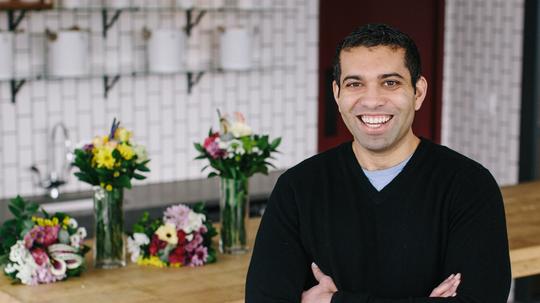
This contributed post was written by Clint Perez, a senior account director at Neustar, Inc. with over 20+ years of experience in marketing with Apple, Best Buy, Discovery Communications and LivingSocial. Perez is a native Washingtonian who in his spare time mentors startups in the D.C. area.
Ajay Kori has always been an entrepreneur, either at heart or in practice. He grew up during the dot.com boom when anything seemed possible. As a teenager, he started and sold his first business. Later in life he launched the first ever pet pharmacy for Amazon.
Now Kori is the co-founder and chairman of flower delivery company UrbanStems. He sat down for a Q&A discussing his journey from neophyte web developer to creator of a new customer experience in the flower industry.
Q. There’s no shortage of flower delivery companies. Why flowers? Where is UrbanStems being successful where others aren’t?
There are tons and tons of flower sites out there, but they all exist over the exact same system. Almost every flower site in the US is based on Flowerwire, including the big guys and a ton of small players. So you essentially have order aggregators who take your order. They don’t actually hold any inventory or maintain operations. They place your order on Flowerwire, which goes to nearest local florist to fulfill. The website takes a cut. Flowerwire takes a cut and obviously the florist has their own overhead costs. You end up paying a really high price because you’re paying three different people.
When you look at it from the local florists perspective, they have other orders to fulfill as well. They have people who walk in the front door of their store who are paying full price and who can become a repeat customer. Then they have the online orders coming in through the wire that are completely anonymous transactions. So they have no chance of a repeat customer and they’re getting paid less than the customer walking in the front door. So, understandably they prioritize their in-store customers first. But as an internet consumer, you’re paying a higher price and your product is being created by someone who is incentivized to take care of their customers first, so you’re not getting a great experience.
When you think about e-commerce, that has made everything better, faster and cheaper. The reason it’s growing so fast is because it’s a better experience than what existed before it. In floral, it’s actually done the opposite. So we came in and said, we’re going to create the best possible experience. For us that means delivering flowers in about an hour, flowers that last for close to two weeks, and complete transparency on your order. It’s better, cheaper, faster than anything that existed, but to pull that off, we had to create the entire infrastructure to deliver on that. Everything that we do is completely the opposite of how the industry does it. We operate our own fulfillment centers, the couriers are actually employees of UrbanStems, we’re dictating what’s being grown at the farms. It’s full-stack vertical integration, which is very different than anything that existed before us. But it results in the best customer experience.
Q. So why the laser focus on Customer Experience?
It’s a bit of a counter-intuitive thing, especially in e-commerce. People assume cut every cost possible and that’s the whole point of e-commerce. But it’s not. What I was lucky enough to see at Quidsi, one of the reasons we were so successful is that we were delivering a better experience. Our competitors couldn’t steal away our customers because they were so sticky. It’s counterintuitive, but if you spend more money up front delivering the best experience, then you move the two most important metrics in e-commerce. You decrease your cost of acquisition because your customers do your evangelizing for you. And you increase their lifetime value because they are stickier and return more frequently. So even though you may be spending more money, you’re creating the best possible experience for customers and at the end of the day your the business generates more money because your cost of acquisition and lifetime value move in opposite directions.
Q. What’s the biggest challenge you face at UrbanStems?
Because we are vertically integrated and deliver within the city within an hour, we have to predict how much demand we’re going to have every single day. Anything over/under we either sell out or have to spoil because we’re never going to send out flowers that are old. So balancing that in creating the best possible experience while being extremely precise with our operations so that we can still make a good margin is very difficult. Luckily we have an amazing group of people here, an all-star team, and we’ve been able to pull off what a lot of people thought was impossible. When we first came into this industry, people who have been in it for 20–30 years thought the customer value proposition we wanted to deliver was impossible. What we found out is that it’s not impossible, but it’s very very difficult. And that’s why you need a really strong team to be able to do it.
Q. Why is D.C. the right place to build your company?
We essentially started the company here for my co-founder’s wife’s career. But it’s ended up being one of the best decisions we’ve ever made. Everyone is just so willing to help out. I was just talking with another D.C.-based founder, and all of us are so close with each other, so willing to do anything for each other. When we had some tough times earlier this year, every single one of them was there for us and helped out in so many different ways. Three of our investors came from introductions from other D.C.-based founders. So many of the investors in UrbanStems are from this area. Because the community is smaller it actually turns into an advantage where everyone is invested in each other, both literally and figuratively, and we want each other to succeed.




